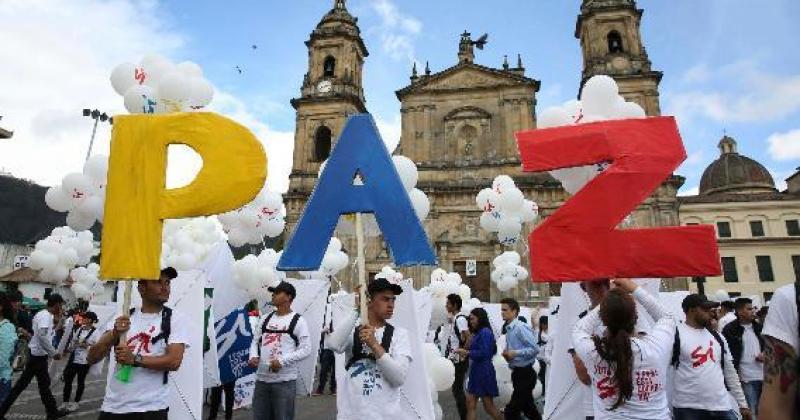A country striving to get out of half a century of violence and guerrillas, plagued by poverty, drugs trafficking and a political oligarchy in the hands of 300 families. Reconciliation and unity of the nation are the key message.
What begins today is one of Pope Francis' most delicate and problematic trips. Of course, Colombia is a great Latin American Catholic country, and an extraordinary popular participation at the papal appointments is surely expected. However, the situation is complex and peace, started with the historic agreement between the government of Nobel Peace Prize-winner President Manuel Santos, and the FARC guerrillas (Colombia's Revolutionary Armed Forces), looks like a small seed already besieged by many threats.
During his fifth pilgrimage to Latin America, the Pope will travel 21,178 kilometers and deliver 12 speeches in Spanish in four different cities: Bogotá, Villa Vicencio, Medellin and Cartagena. A quite long visit, to foster the first steps towards reconciliation and peace. But Francis is not going to Colombia as a mediator, to be "guarantor" of that agreement obtained with great effort but that was actually rejected by the popular referendum. An agreement which became subject of a fierce political confrontation between the government and the opposition led by former President Álvaro Uribe. And while he will call for reconciliation, the only way to end a violent civil war that has claimed hundreds of thousands of innocent victims and shattered entire families, the Pope will keep away from the controversy over the terms of the agreement signed last year.
Since April 9, 1948, day of the murder of presidential candidate and liberal Catholic leader Jorge Elicer Gaitán, Colombia has suffered seventy years of internal violence characterized in the last half century by the Marxist-Leninist guerrilla groups on one side and, on the other, by far-right paramilitary groups, as well as by a massive presence of drugs trafficking, which is far from diminishing. Only in the last half century there were 230,000 victims, mostly civilians.
The choice of FARC guerrillas to set their weapons aside and become a political party in exchange for immunity and access to parliament, as stated in the agreement, was not without consequences. The population wanted the end of the civil war, but the trail of blood, the dead or the kidnapped, can not be forgotten by simply wiping the slate clean. The agreement, which in September 2016 became operational, but then rejected by the referendum, is therefore only a first step. A first fragile step. What remains are the odds and the fear of a future full of potential revenge, killings and violence. While there are some who fear that part of the FARC's weapons - only 40% have been handed over- have been hidden beyond the border with Venezuela, there are others who are questioning which funds in tax havens the former guerrillas are still enjoying.
Guerrilla and social injustice also led to two million displaced persons, families who had to abandon their homes and land: there can be no fair peace without addressing the problem of their return along with the issue of converting the crops in the country, which is the world's first cocaine producer and where production has not dropped in the last two years.
It is difficult to imagine a peaceful future of shared participation in Colombia where, from 1948 to date, the political ruling class - both liberal and conservative - belongs to no more than 300 families linked to each other. President Santos, now at the end of his mandate, is considering which candidacy to support, knowing that even his closest collaborators, once in power, could renegotiate the peace agreements. The current opposition leader Uribe has been president and mentor of Santos himself. If he should win, a renegotiation of that arduous deal would be inevitable, since Uribe considers it an open door to a "castro-chavista" drift.
As the Colombian power-oligarchy fosters its ambitions, 50 per cent of the people live in poverty, with nearly a million children roaming the streets and scavenging rubbish for food. Colombia is a country in which exploitation of child labor is still very present. In these situations of poverty, must be sought the causes of violence of the last half century. A violence that has unfortunately turned into a culture of violence: private police, paramilitary groups, professional killers. For this reason, there is a strong need of righteous laws, which the Pope will calls for so the law of the strongest will not prevail.
Without a process of political reconciliation, which still does not appear on the horizon, peace remains fragile, tied to a thin thread, at the mercy of radicalization and polarization of internal political debate.
Obviously, all players in the field will try to take advantage of the Pope's presence these days. President Santos, whose popular consensus is at its lowest according to the latest polls, considers Francis’ visit the consecration of his work. Uribe's opposition will weigh the Pope’s every single word to try to avoid this message to come through. Even the FARC and ELN guerrillas - National Liberation Army, born out of Catholic matrices, who, just two days ago, announced a ceasefire and the signing of a bilateral agreement with the government - will do everything to be able to appear on the spot.
Finally, in the background of this overseas journey is the very serious crisis in Venezuela. In Colombia, there are tens of thousands of displaced people from the country ruled with an iron fist by President Nicolás Maduro. Surely, Francis is going to Colombia, not Venezuela, however, there are those who expect him to find a way to send a message of closeness to the suffering Venezuelan people.
